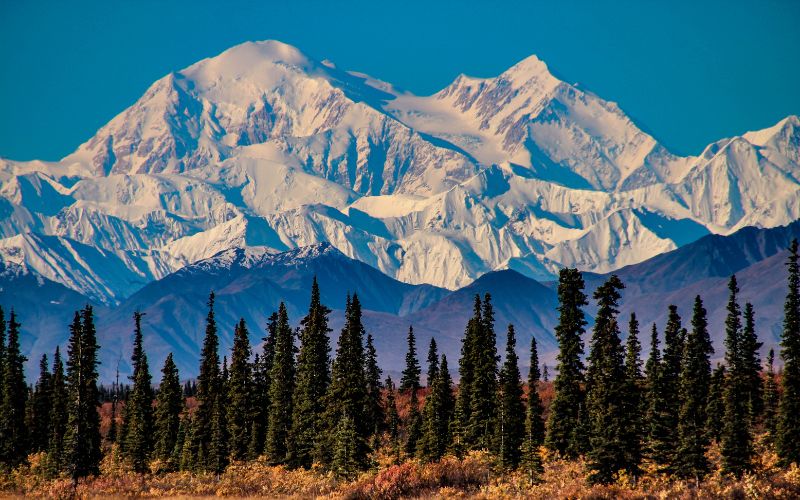
- Details
- By Judith LeBlanc
Guest Opinion. On his first day in office, Trump signed an executive order to rename the country’s highest peak. Alaska’s Koyukon Athabascans have called the mountain Denali for centuries. The United States bought Native Alaskans' land from Russia in 1867 while making war with Native tribes for land. In 1917, the federal government renamed it “Mount McKinley” in honor of the 25th president of the United States, William McKinley.
The government should have honored the history of the Native Alaskans, not a president who never even stepped foot in the territory.
Fortunately, in 1975, the state of Alaska changed the name of the mountain to Denali and officially requested that the United States do the same. Four decades later, in 2015, the Obama administration honored that request and restored the mountain’s traditional name.
That should’ve been the end of the story. Instead, Trump once again is attempting to erase our history.
Now, Republican Senators Lisa Murkowski and Dan Sullivan have co-sponsored legislation with the support of Native Alaskan Tribes to overturn Trump’s order and recertify Denali as the official federally recognized name, and they need our help to pass it.
In his executive order titled “Restoring Names That Honor American Greatness,” Trump said naming the mountain Denali was “an affront to President McKinley’s life, his achievements and his sacrifice” and that no one cares about the name change.
Koyukon Athabascans have stewarded the land since time immemorial as the original inhabitants. The name Denali, means “the high one” or “the great one”, which fits the country's tallest mountain.
To not just deny Alaska’s Indigenous peoples the right to name the land and their contributions, but also to honor a man who never even set foot in the state over the people who live there is to reinforce the dominant narrative that Native peoples are irrelevant people of the past.
Hawwih (“thank you” in Caddo) for organizing to protect our collective shared history from those who wish to erase it.
Judith LeBlanc (Caddo), executive director of Native Organizers Alliance Action Fund, whixh is a partner to Native Organizers Alliance.
More Stories Like This
Governor Stitt, it’s raining. Save SNAP.Remembering My Grandma During Native American Heritage Month
HHS Secretary Kennedy to Indian Country: Even During a Shutdown, Your Health Care is My Priority
Finding the Good News: MacKenzie Scott’s Quiet Commitment Amidst the Noise
Martial Law in an American City —1929
Help us tell the stories that could save Native languages and food traditions
At a critical moment for Indian Country, Native News Online is embarking on our most ambitious reporting project yet: "Cultivating Culture," a three-year investigation into two forces shaping Native community survival—food sovereignty and language revitalization.
The devastating impact of COVID-19 accelerated the loss of Native elders and with them, irreplaceable cultural knowledge. Yet across tribal communities, innovative leaders are fighting back, reclaiming traditional food systems and breathing new life into Native languages. These aren't just cultural preservation efforts—they're powerful pathways to community health, healing, and resilience.
Our dedicated reporting team will spend three years documenting these stories through on-the-ground reporting in 18 tribal communities, producing over 200 in-depth stories, 18 podcast episodes, and multimedia content that amplifies Indigenous voices. We'll show policymakers, funders, and allies how cultural restoration directly impacts physical and mental wellness while celebrating successful models of sovereignty and self-determination.
This isn't corporate media parachuting into Indian Country for a quick story. This is sustained, relationship-based journalism by Native reporters who understand these communities. It's "Warrior Journalism"—fearless reporting that serves the 5.5 million readers who depend on us for news that mainstream media often ignores.
We need your help right now. While we've secured partial funding, we're still $450,000 short of our three-year budget. Our immediate goal is $25,000 this month to keep this critical work moving forward—funding reporter salaries, travel to remote communities, photography, and the deep reporting these stories deserve.
Every dollar directly supports Indigenous journalists telling Indigenous stories. Whether it's $5 or $50, your contribution ensures these vital narratives of resilience, innovation, and hope don't disappear into silence.
 The stakes couldn't be higher. Native languages are being lost at an alarming rate. Food insecurity plagues many tribal communities. But solutions are emerging, and these stories need to be told.
The stakes couldn't be higher. Native languages are being lost at an alarming rate. Food insecurity plagues many tribal communities. But solutions are emerging, and these stories need to be told.
Support independent Native journalism. Fund the stories that matter.
Levi Rickert (Potawatomi), Editor & Publisher
